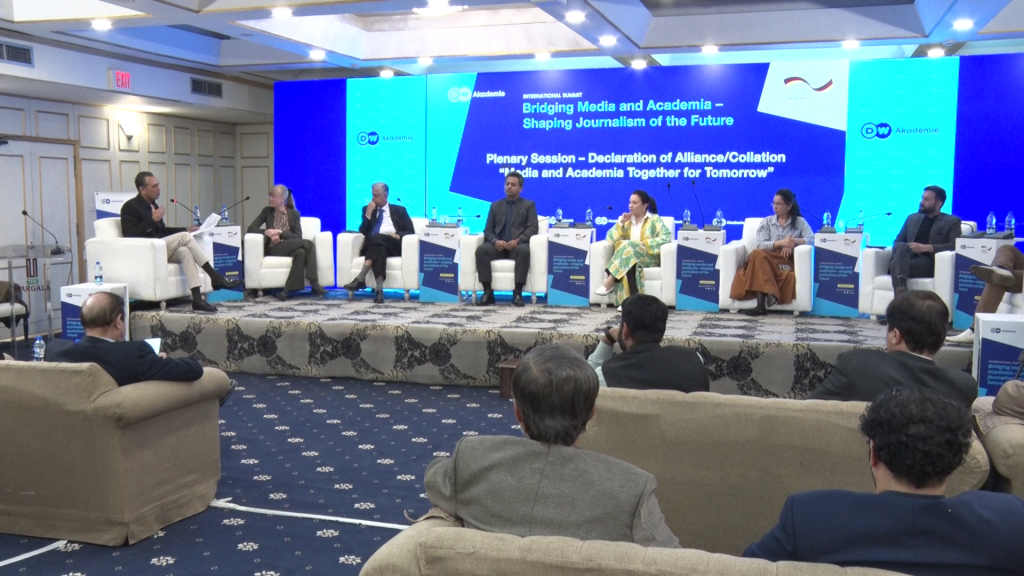Bridging Media and Academia: DW Academia’s 4-Day Conference Charts the Future of Journalism
A four-day conference titled “Bridging Media and Academia: Shaping the Journalism of the Future” concluded at Margalla Hotel Islamabad, bringing together students, faculty members, policymakers, foreign delegates, and leading figures from Pakistan’s media landscape. Organized under the umbrella of DW Academia, the event served as one of the most significant national dialogues on the evolving relationship between journalism and higher education.
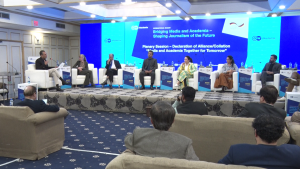
A Global and National Panel of Voices
The conference hosted an impressive roster of international speakers from Kazakhstan, Kyrgyzstan, Bangladesh, Uzbekistan, and Mongolia. Their participation broadened the conversation, adding diverse global perspectives on media transformation, newsroom challenges, and the academic structures required to prepare the next generation.
The conference was also attended by the German Ambassador, adding diplomatic support to the dialogue on strengthening journalism.
Prominent Pakistani journalists, including Talat Hussain, Absar Alam, Fahad Hussain, and Aniqa Nisar, contributed dynamic insights. Advisor to the President Murtaza Solangi and MNA Tariq Fazal Chaudhry also joined the panel, emphasizing the importance of policy support in strengthening journalism education.
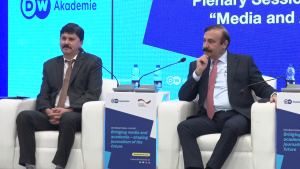
Industry Meets Academia
Top practitioners from mainstream media shared practical experiences from newsrooms across Pakistan. They highlighted the widening gap between academic programs and real-time newsroom demands. Faculty members and students engaged actively, reflecting a shared desire to modernize journalism education and align it with global trends.
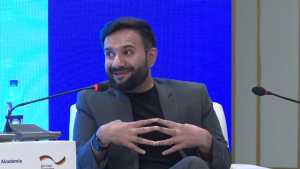
Executive Director Khyber Network, Kaiwan Hamid Raja
Among the distinguished panelists, Executive Director Khyber Network, Kaiwan Hamid Raja, delivered one of the most compelling contributions. His remarks captured the core challenges facing modern journalism—truth, trust, and the pressure of digital metrics.
While speaking to the audience, he stated:
“Media had regulation systems, accountability and authenticity. Now we are faltering over there as well. Authenticity in legacy media has been challenged, and that is because of that complex; that we have because of the measurable performance analysis. The measurable performance analysis is through numbers, and those numbers are basically putting us under a lot of pressure to actually leave what we were known for — authenticity.”
Kaiwan Raja’s commentary underscored a powerful truth:
The pursuit of ratings, reach, and digital numbers is gradually overshadowing the principles that once defined credible journalism. His analysis resonated strongly with both practitioners and students, as it addressed a concern common across newsrooms worldwide.
His intervention served as a reminder that journalism’s future depends on recalibrating its values—especially as legacy institutions compete with fast-paced digital ecosystems.
Why Kaiwan Raja’s Perspective Matters
- He represents a new generation of executive leadership in Pakistan’s media.
- His critique recognizes both structural challenges and cultural shifts inside newsrooms.
- He stresses accountability and authenticity as irreplaceable pillars of credible journalism.
- He connects academic training with newsroom realities, highlighting the urgent need for reform.
Kaiwan Raja’s voice added depth to the conference’s central message: Journalism can evolve without losing its soul.
Purpose and Outcomes of the Conference
The event aimed to strengthen the triangular collaboration between:
- Media organizations
- Universities and journalism schools
- Government and policy circles
Throughout the four days, speakers emphasized the need to:
- Introduce joint training programs
- Launch reporting exchanges
- Encourage research collaborations
- Promote cross-disciplinary learning
- Build curricula that reflect newsroom realities
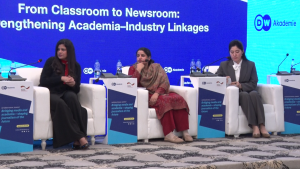
The participants agreed that long-term cooperation between academia and the media industry will help bridge skill gaps while nurturing journalists capable of navigating an increasingly complex information ecosystem.
Conclusion
DW Academia’s conference succeeded in sparking meaningful conversation about the future of journalism in Pakistan. The presence of seasoned journalists, global experts, and young media students created a rare, productive environment.
Within this dialogue, Executive Director Khyber Network Kaiwan Hamid Raja emerged as a key voice reminding the industry that authenticity remains the heart of journalism. His focus on ethical standards, accountability, and newsroom pressures added essential depth to the discussions and set the tone for future reforms.
As Pakistan’s media landscape continues to shift, such platforms will remain vital in shaping a new generation of professionals who value credibility as much as innovation.

